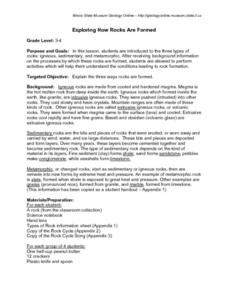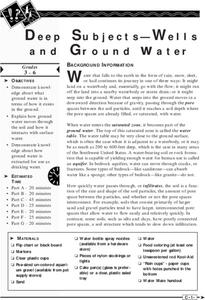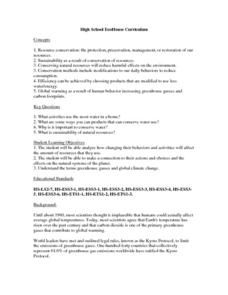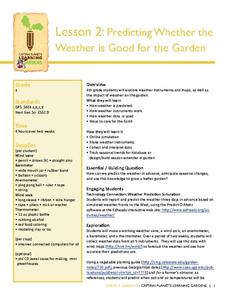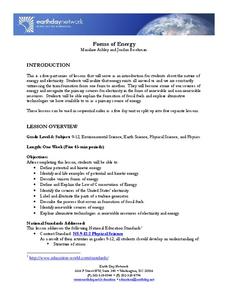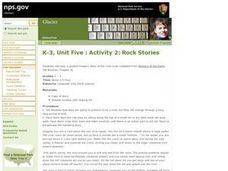Chicago Botanic Garden
Historical Climate Cycles
What better way to make predictions about future weather and climate patterns than with actual climate data from the past? Young climatologists analyze data from 400,000 to 10,000 years ago to determine if climate has changed over time....
Science 4 Inquiry
Layers and Laws: The Law of Superposition and Index Fossils
What can layers of rock teach us about the climate? Young scientists solve a mystery about who stole a cookie by applying the law of superposition. Then, they apply the same concept to solve a more difficult mystery, trying to determine...
Curated OER
Exploring How Rocks Are Formed
These lessons produced by the Illinois State Museum are quite good. In this one, third and fourth graders are introduced to the three basic types of rocks: igneous, sedimentary, and metamorphic. They perform activities which help them...
Curated OER
Moh's Hardness Test
Young geologists utilize Moh's hardness scale to help them correctly sort and classify different types of rocks. This lesson has everything you need, including an excellent example of the Mohs' Hardness Test, to successfully implement...
Curated OER
Neither Wind Nor Rain
Here is another in the interesting series of lessons that use the special State Quarters as a learning tool. This one uses the North Dakota State Quarter. During this lesson, your class learns about the different patterns of erosion, and...
PricewaterhouseCoopers
Conservation: Water
Here is a fantastic experiment-based lesson on water conservation, waste, and filtration. The lesson plan is well-developed and provides background information, discussion leads, and six scripted lab activities anyone can do. The class...
California Academy of Science
Global Climate Change and Sea Level Rise
Ice is nice, and its condition on the planet has a significant effect. Junior geoscientists experiment with ice melting in both water and on land to discover how each affect the rising sea level. This detailed lesson outline even...
NOAA
What Little Herc Saw
See the underwater world through a different pair of eyes! Middle school marine biologists identify deep-sea organisms by examining images taken by an ROV from the Okeanos Explorer. After determining what creatures lie beneath the...
Curated OER
Deep Subjects - Wells and Ground Water
Here is a phenomenal lesson plan on ground water, wells, and aquifers. Young geologists study how water exists underground, how water moves through the soil, and how water is extracted to be used as drinking water. Some excellent...
Curated OER
The Formation of Coal
In this coal formation worksheet, students read and informational sheet about coal formation. Students are given 5 short-answer questions regarding what they've read.
Curated OER
The Water Cycle
Observe the stages of the water cycle by completing 3 activities. To help understanding of the water cycle your students can observe evaporation, the formation of frost, vapor and water and the process of distillation which is used to...
Curated OER
High School EcoHouse Curriculum
How has the level of carbon dioxide changed over recent years, and what is contributing it? Groups work together to research and present their findings in a creative way. Also built into the lesson is a visit to a sustainable house, but...
Captain Planet Foundation
Predicting Whether the Weather is Good for the Garden
Can your class predict the weather? Show them how they can come close with a lesson about creating weather instruments, including weather vanes, barometers, wind socks, anemometers, and thermometers. Kids research weather patterns and...
Curated OER
Understanding the Water Cycle
Investigate the water cycle and how water moves from the land to the air and back to the land. Create a terrarium and observe the water cycle at work. Define weather terms including evaporation, condensation, and precipitation.
Purdue University
Design of an Earthen Dam for a Lafayette Neighborhood
How do dams support bodies of water? Scholars engage in a hands-on STEM activity where they design, build, and test dams to learn about bodies of water and how humans use natural resources. They learn how criteria and constraints affect...
Curated OER
Greenhouse Gases
Although the worksheet for the lab activity is not included, this is an activating activity for your class to do when learning about the greenhouse effect. They lay three thermometers underneath a lamp: one out in the open, one under a...
Earth Day Network
Forms of Energy
Give me a home where electric buffalo roam and I'll show you an ohm on the range. Introduction your classes to potential and kinetic energy, electricity, and renewable resources with a resource that combines observation, direct...
NOAA
Biological Oceanographic Investigations – Signals from the Deep
The Deepwater Horizon oil spill directly impacted an area of the Gulf of Mexico the size of Oklahoma. A marine biology lesson looks at the impact of an oil spill on the deeper parts of the ocean. Scholars download actual data collected...
NOAA
Deep-Sea Ecosystems – A Tale of Deep Corals
Many have debated which came first, the chicken or the egg, but this lesson debates which came first, the hydrocarbons or the carbonate reef. After a discussion on deep-sea corals, scholars receive a set of questions to research and...
Cornell University
Exploring Rocks and Minerals
Investigate the properties of rocks and minerals through a rockin' hands-on activity. Learners test rocks for various properties and, using a guide, attempt to identify different samples. They use various properties including hardness,...
NOAA
A Quest for Anomalies
Sometimes scientists learn more from unexpected findings than from routine analysis! Junior oceanographers dive deep to explore hydrothermal vent communities in the fourth lesson in a series of five. Scholars examine data and look for...
Curated OER
Time Line Reporters
Individuals in your class research the origin of an animal and present their discoveries to the class. The first appearance of the animal and its date of extinction are indicated on a class time line.
Curated OER
Rock Stories
Youngsters pretend they are rocks sitting on a hill. They listen to the provided guided imagery script to conceptualize the process of how rocks change over time. They draw a diagram of what happened to them as rocks during the story. An...
NOAA
Ocean Geologic Features
Sediment samples from the ocean bottoms tell scientists about climate change, pollution, and changes in erosion for the area. Groups of learners focus on sediments and their movement through water. During a hands-on activity, they...
Other popular searches
- Earth Science Moon Phases
- Branches of Earth Science
- Earth Science Minerals
- Earth Science Inquiry
- Earth Science Lesson
- Earth Science Lesson Plans
- Basic Earth Science
- And Earth Science
- Earth Science Map Reading
- Earth Science and Art
- Earth Science Vocabulary
- Science Earth Layers




